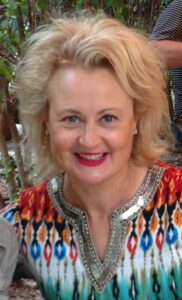
Carolina Lehoczky Fernandez (’79, P ’09)
Opening bakeries in Rwanda and teaching women there how to build creative careers wasn’t exactly how Carolina Lehoczky Fernandez (’79, P ’09) envisioned her life when she was a pre-med student majoring in religion at Wake Forest.
It also wasn’t part of her plan when she landed in business school, forging instead a career in finance and investment management. And Rwanda might have been farthest from her mind as she became what she calls a “professional mother,” raising her four children and dabbling in creative endeavors. She wrote books, got involved in interior design and never fully lost sight of her first love — creating art. Floral paintings have been a specialty.

Hand-rolled clay beads, fresh out of the oven. The beads are strung into necklaces at flourFLOWER.
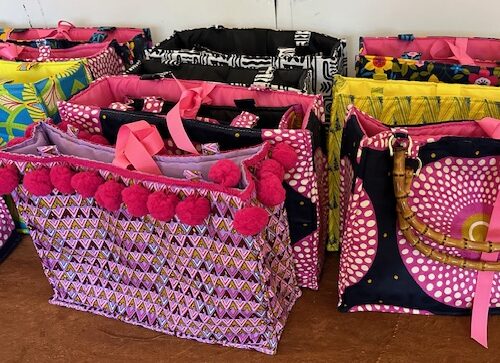
Fernandez' company, flourFLOWER, sells tote bags, jewelry and more.
But, as it turns out, those skills she acquired over the years — from her business sense to her experience as a mother and an artist — all inform her work in Rwanda today. There, she and her husband, technology executive Ernie Fernandez (P ’09), seed bakeries that feed hungry people and provide jobs and skills for Rwandans. Separately, through her for-profit social endeavor flourFLOWER, she gives Rwandan women the creative skills and jobs to help them support their own families.
“Everything in my life kind of came together to this,” says Fernandez, who divides her time between south Florida and Connecticut. “And not only is this what I’m supposed to do, … but it’s what my heart desires.”
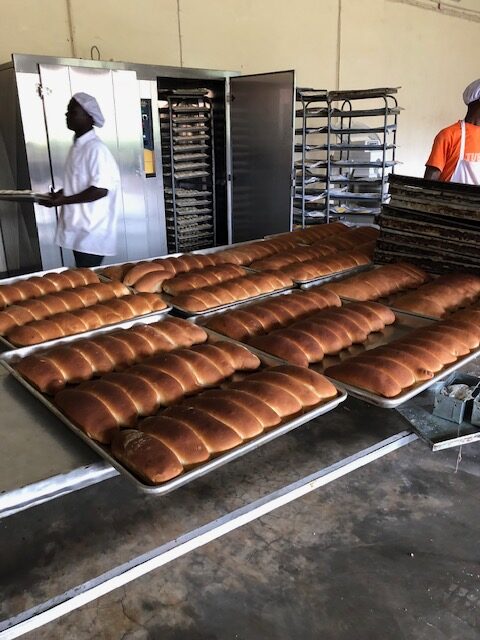
Her eye-opening journey to Rwanda
Africa entered Fernandez’s radar in 2012. Her daughter was attending Babson College near Boston, and Babson leaders asked the couple if they’d be interested in making a larger gift to the institution. The couple said they would, but only to support a program that intersected with women and leadership and faith.
“We thought that was going to be a tall order,” Carolina Fernandez says. But, not long after, Babson asked the couple if they’d be willing to cover the cost of sending students in its Frank & Eileen Center for Women’s Entrepreneurial Leadership to teach entrepreneurship at a Catholic school in rural Rwanda, and they did.
Fernandez joined them for a week for what turned out to be a life-changing trip. Nearly 20 years after the 1994 genocide that targeted ethnic Tutsis, Fernandez noted the joy and hope in the Rwandan people. Two brothers, owners of the Inema Arts Center in Kigali, Rwanda, the capital, rolled out the red carpet. And Sister Augusta Mukarugomoka, CFO of the Benebikira Sisters, Rwanda’s longstanding Catholic order of nuns, was focused and diligent about making life better for people, despite having lost her entire family in the genocide.
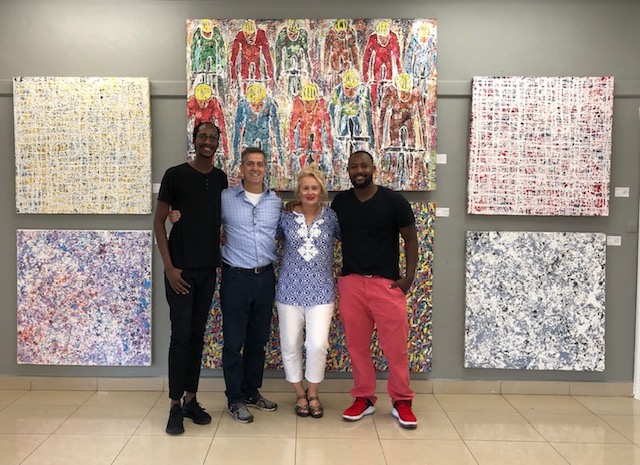
From left: Innocent Nkurunziza, Ernie Fernandez, Carolina Fernandez and Emmanuel Nkuranga at the Inema Gallery. Nkurunziza and Nkuranga are brothers and co-founders of Inema Arts Center. Carolina and Ernie Fernandez purchased the painting at top center.
Fernandez had seen poverty before on mission trips to Central America. And she understood how tragedy could be life-altering, because her father died in a plane crash when she was a child.
“But what they experienced, the losing almost a million people in the genocide, it’s just beyond unthinkable,” she says. “And they came out of it as a nation, as a people, still so full of joy. The impression it made on me was, ‘Wow, they can be this joyful. Given what they’ve been through, I can be that joyful, too.’”
First came the bakery
But witnessing the poverty, especially hungry kids, shattered her, she says. About 50% of Rwandans are considered “multidimensionally poor,” lacking money, education and basic infrastructure, according to the United Nations. Another 23% are considered vulnerable to that level of poverty.
Mukarugomoka mentioned that she was seeking funding to build a bakery, and Fernandez and her husband made a contribution to the project later that year. The first bakery opened in 2014, and by 2023 there were three large wholesale bakeries, along with some smaller retail outposts.
“But what (Rwandans) experienced, the losing almost a million people in the genocide, it's just beyond unthinkable. And they came out of it as a nation, as a people, still so full of joy."
The bakeries, all run by the Benebikira Sisters, each employ about 20 to 30 part-time and full-time workers, who bake more than one million pieces of bread a year in each bakery. Each bakery produces enough to feed approximately 39,000 people every week, including 5,000 children.
“Everything from the vision to the primary execution to the day-to-day boots on the ground is all a result of the sisters’ efforts and work,” Fernandez says. “We are just in the background.”
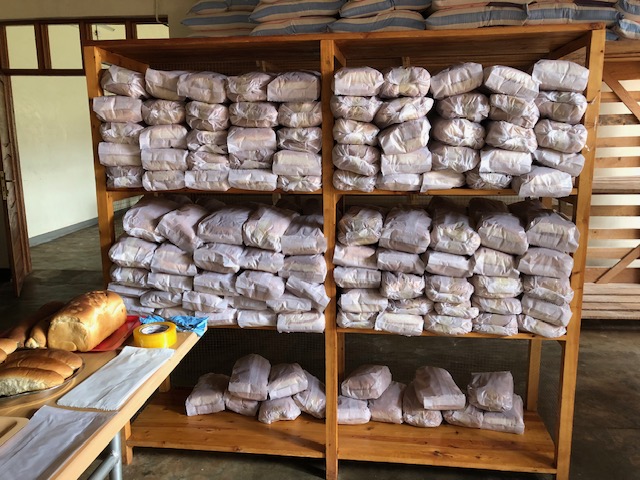
Bagged bread
The lightbulb moment for the flourFLOWER enterprise came in 2018 during a trip to Rwanda when Fernandez became enamored with the country’s colorful fabrics. She bought a couple of small bags from a local museum’s shop and some fabric in the fabric market.
At the time, FEED, a brand with burlap bags emblazoned with that word, was growing in popularity. The company donates proceeds back to world hunger and school meal programs. On each bag, it shares how many people are fed as a result of each purchase.
But, in Rwanda, Fernandez knew that the giant plasticized bags of flour used in the bakeries contained the ingredients that actually fed people and, what’s more, featured bright colors and scenes. She asked Mukarugomoka how many people each bag fed. The answer came on the early morning of Mother’s Day 2018 when Mukarugomoka knocked on her hotel door: 700.
“And I just started crying. We’re going to take the African fabrics and flour bags and we’re going to sell them with the tag, ‘Fed 700 kids,’” says Fernandez, teary from the memory.
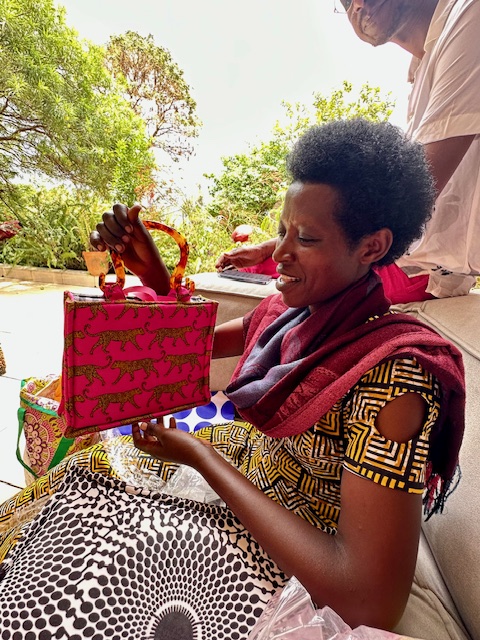
A seamstress working in Kigali. She holds a bag before it receives its pom poms.
She structured flourFLOWER as a social enterprise, a mission-driven business, instead of a more traditional nonprofit. “I believe we can do more good by being for-profit because, ultimately, if we’re profitable, that money can go further,” Fernandez says.
Leading a nonprofit also would require her to focus on raising money, not creating, and that’s not how she wanted to spend her time. “I’d rather partner with an excellent nonprofit than be a tiny nonprofit,” she says. “It was just too restrictive for me. I just think entrepreneurship, as a whole, opens up the imagination more in a way that felt right for me.”
“We are much more concerned about helping women over there build well-crafted lives and create lives of meaning and purpose and have money (and) sustainable lives than we are about the sales end here."
The long-term goal for flourFLOWER is to fund more bakeries in Rwanda. For now, money raised supports flourFLOWER’s workrooms, materials and machines, so the women have the space and resources they need to make the bags, jewelry and other pieces. Items are sold online, at pop-up sales in the United States and at the Inema Arts Center. Customers also can commission a custom piece through pink palm beach, a sister endeavor launched in 2023.
“We are much more concerned about helping women over there build well-crafted lives and create lives of meaning and purpose and have money (and) sustainable lives than we are about the sales end here,” Fernandez says.
Operating in Rwanda doesn’t come without its issues. Shipping to and from the landlocked country in central Africa is expensive, and communication is difficult. At the ribbon-cutting ceremony, the first bakery had everything it needed to operate as a full-size, commercial bakery except one essential — electricity. “We had to find an electrician who could come to the village and power it up,” Fernandez says.
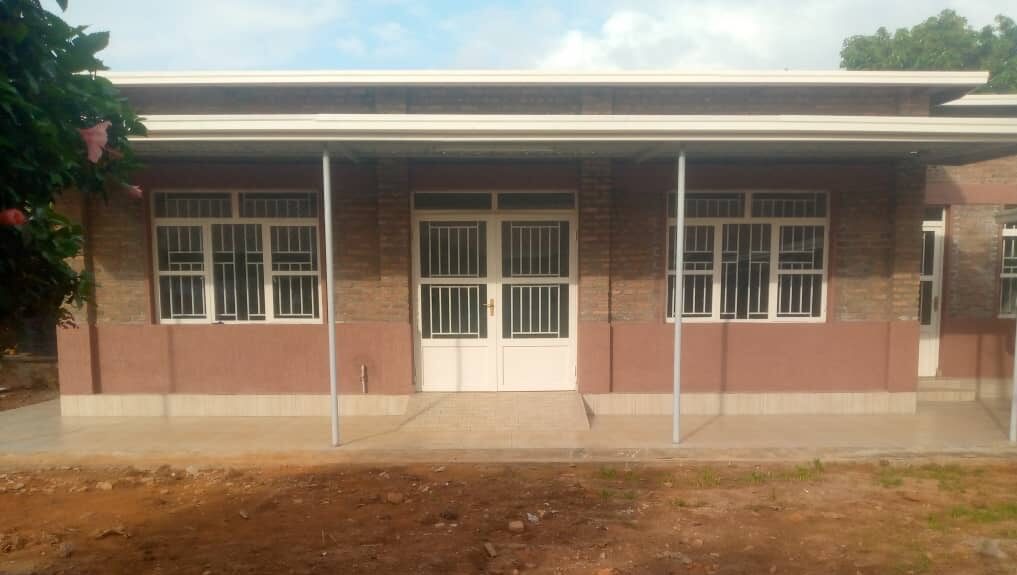
The third and newest bakery in Kabuga, Rwanda
Fernandez has learned so much about making things work in places with few resources that Jody Greenlee, a longtime friend, has sought her advice. Greenlee is founder and executive director of Finding Freedom Through Friendship, a nonprofit that operates in such challenging locations as Egypt and Guatemala.
“You cannot effectively help people in a foreign country from America if you’re sitting at your desk,” Greenlee says. “You have to meet them where they are, and she’s spectacular about that.”

A growing enterprise and passion for entrepreneurship
Over the next year, Fernandez says she’s working on a new flourFLOWER project that could include an artisan trade school in Rwanda and art shows at galleries that feature fine art based on Fernandez’s vision and created by women working with flourFLOWER.
And, as she works in Rwanda, she’s also giving back to Wake Forest as a member of the University’s Center for Entrepreneurship Advisory Council.
“She’s just very convicted about Pro Humanitate, and … students leading lives that have purpose and of service, no matter what they do, creating economic value and human value,” says Beth Dawson McAlhany (’89), Wake Forest’s senior director of college initiatives, who oversees advancement for the entrepreneurship center. “She is just a real beloved member of our council and a connector with our students.”
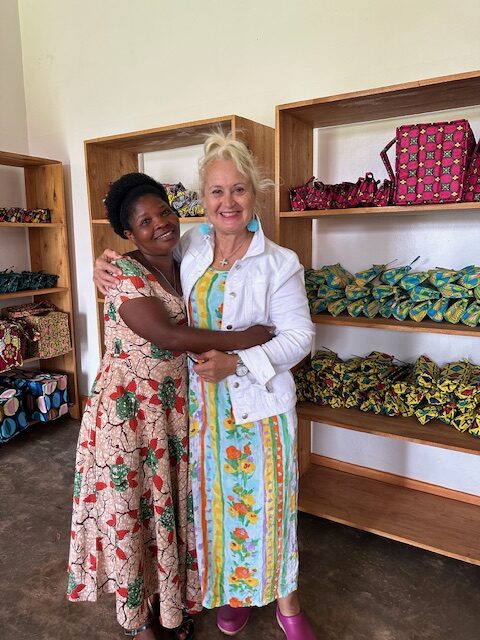
Esperance, a head seamstress in one of flourFLOWER's workrooms. She sews casual fabric bags.
It’s been decades since Fernandez was a student at Wake Forest. Her younger sister, Cynthia Lehoczky Waters (’82), and son Nicolas Fernandez (’09) also attended. She hasn’t followed the path she intended when she stepped onto campus, but her underlying motivation hasn’t changed, a respect for the dignity of every human, a belief punctuated by Wake Forest’s Pro Humanitate motto.
“I love that that’s such a huge part of what Wake Forest stands for,” Fernandez says. “I love that that’s part of the mission. … Even with a label or no label, I just think that’s the way I’ve lived my life.”
Sarah Lindenfeld Hall is a longtime North Carolina-based journalist, former staff writer for the Winston-Salem Journal and The (Raleigh) News & Observer and founding editor of WRAL-TV’s popular parenting website. Today, she’s a freelance writer, regularly diving into stories about interesting people and parenting, health, education, business and technology topics.


